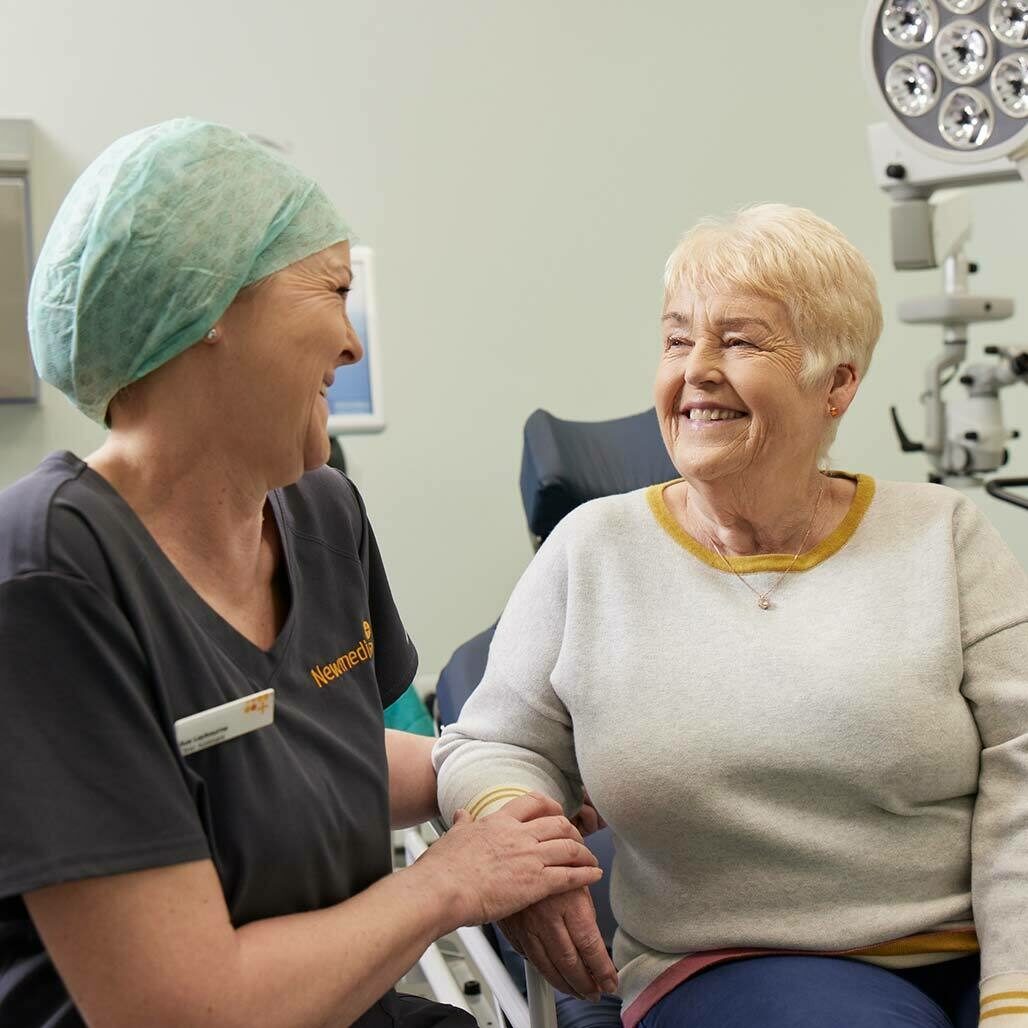What are cataracts?
Cataracts are a very common eye condition that usually develop as you age. They develop when the eye’s clear lens forms cloudy or misty patches. Although cataracts won’t usually cause any damage, they often impact your vision, making it seem like you’re looking through a frosty window. So treatment is often recommended to help restore your vision and get you back to doing what you love.
Learn more about cataracts with Nigel Kirkpatrick, consultant ophthalmologist and partner at Newmedica Gloucester.

What are the symptoms of cataracts?
Cataracts can form in one or both eyes and typically develop slowly over several years, so you might not notice any symptoms at first. But usually, you’ll experience blurred or cloudy vision, or have patches where your vision isn’t as clear. It’s a bit like looking through a frosted or foggy window. Cataracts can also cause glare or haloes around lights, which means you might struggle to see your surroundings clearly.
Making private cataract care more affordable to more people
We offer a range of high-quality lenses for cataract patients that aid distance and intermediate vision starting from just £2295 per eye, so we’ll ensure you can get back to doing what you love as quickly as possible. For those seeking treatment, our private cataract surgery offers a quick and convenient solution with expert care.

Private cataract treatment with Newmedica
We offer a range of high quality lenses for distance and intermediate vision starting from just £2295 per eye, so you can get back to doing what you love as quickly as possible.
What causes cataracts?
The lens in your eye is usually clear, so that it can focus the light coming into your eye onto your retina, where the images we see get sent on to the brain. Over time, this clear lens naturally starts to become cloudy or develop misty patches, which in turn makes your vision blurrier.
How are cataracts diagnosed?
Your optometrist will usually spot signs of cataracts during your regular eye exam. Then they’ll refer you on to specialists like us to carry out some more tests on your vision and sort out a treatment plan for you.

What is cataract surgery?
Cataract surgery is a common procedure that involves removing the cloudy lens (cataract) and replacing it with a new, artificial lens (known as an intraocular lens) to restore your clear vision.
Who might need cataract surgery?
Cataract surgery is recommended when it starts getting difficult to see and carry out your normal day-to-day activities. Surgery is the only treatment available for cataracts at the moment. Without surgery it’s likely that it will gradually get worse over time.
What are the benefits of cataract surgery?
The most obvious benefit is the improvement in your vision. Surgery restores clarity and stops your vision from changing any further. You might also notice an improvement in sharpness, brightness and your perception of colour.
Cataract surgery also offers a chance to correct your glasses prescription, so you can reduce your dependence on glasses. Sometimes you might not need to wear your full-time glasses at all after surgery.
What happens during cataract surgery?
Post operation
After surgery, we might recommend popping a small plastic shield over your eye to protect it from any accidental damage. We’ll do this for you after surgery if needed and you can reapply once you get home if you prefer.
You’ll need to use eye drops for about three weeks after your surgery. These are prescribed by your consultant, and we’ll make sure you know how and when to use them before you go home.
You can go home on the same day, but you won’t be able to drive straight away. We’d recommend that you have someone you can contact for about 24 hours after your procedure, just in case you need a bit of help when you get home.
We’ll give you a call the next day to make sure you’re okay, that your vision is returning and you’re happy with how to use your eye drops. We’ll also arrange the necessary follow-up appointments with your consultant or preferred optician to make sure your recovery is on track and your vision is clear.

How long does it take to recover from cataract surgery?
You’ll usually be up and about straight away, but it’s important to take things easy. You can get up, prepare simple meals, go for a walk or watch TV – but it’s best not to plan to be too busy just in case your eye feels a bit uncomfortable.
It’s normal to experience some itchiness, sticky eyelids, or fluid discharge from the treated eye in the first few days, so don’t worry. If you have any mild discomfort, this can be managed with paracetamol as advised.
After a few days, even mild discomfort should disappear, and in most cases, healing will take about two to four weeks.
During recovery, you can wear a plastic shield at night to protect your eye while you’re sleeping. Your consultant will also give you some eye drops to use for about three weeks to reduce inflammation and allow healing.
If you need more information about cataract surgery, our cataract booklet is an excellent resource to find what you're looking for.
What are the possible complications?
Although the vast majority of patients won’t experience any complications, as with all surgery there are some risks of complications. Our team will discuss these with you in detail at your appointment and will make sure you’re happy to go ahead with treatment. We take every step to reduce our complication rates and we have excellent results that we publish on the National Ophthalmology Database (NOD).
Some people might develop a common complication after surgery where the membrane behind the artificial lens goes cloudy, which is known as posterior capsular opacification (PCO). This is easily treated with a procedure called YAG laser capsulotomy.
How do I get referred for NHS cataract surgery?
Your optician or GP will discuss the various treatment options available to you and where you can choose to have your treatment. You’ll be able to take the time to decide where you’d like to be treated, and your optician or GP will make the arrangements for your referral to Newmedica.
What’s the difference between NHS and private cataract surgery?
There are a few differences when it comes to NHS and private cataract surgery.
When you can have surgery
Sometimes you might have to wait a little longer to receive cataract surgery on the NHS. This is because the NHS have certain thresholds, usually linked to impact on vision, to qualify for NHS cataract treatment. If you decide to go private for your cataract surgery, you can have the procedure when you feel that your vision is affecting your lifestyle, so you don’t necessarily need to meet the local NHS guidelines.Your lens options
During cataract surgery, your cloudy lens is replaced with a lens implant. The type of lens you choose will determine how well you see without glasses after your cataract surgery. With NHS cataract surgery, the standard replacement used is called a monofocal lens, which improves your vision for a specific distance (like up close or far away).
With private surgery you can still have a monofocal lens replacement, but you also have the option to choose a different type of lens which could reduce your dependency on glasses after your surgery (at an additional cost). This includes:
A multifocal option – for good distance, intermediate and up-close vision.
An extended focus option – which provides a continuous focus over a range of distances.
If you have astigmatism (where the cornea at the front of the eye is shaped more like a rugby ball than a football), you can get the right correction incorporated into any of these specialist lenses. This type of corrective lens is known as toric, which you might have heard of before if you wear contact lenses.
Your consultant will talk through all your options for you to think about before having surgery, so you can decide what’s right for you and your lifestyle.
How much does the treatment cost?
If the Newmedica clinic that you choose is able to offer the treatment through the NHS, then all of your treatment costs with Newmedica are fully covered, with no additional cost to you.
Private cataract surgery starts from £2,295 per eye for a monofocal lens replacement. There are a range of costs for the specialist lens types available and we’ll explain this clearly to you. We offer a single fixed price so that there aren’t any hidden fees for consultations or diagnostic tests to surprise you – so that means you pay one price for surgery, your replacement lens, all pre- and post-operative appointments, and all medication.
Do I need a referral for private cataract surgery?
If you’re a private patient, you can just get in touch with us directly. But if you’re using private medical insurance, you might need some more information to make your claim. You can find all the details on our private eye care referral page.
What’s included in the private treatment package?
Our cataract package includes:
Free consultation
A set of comprehensive diagnostic tests – including corneal topography to help with lens choices
Surgery at the earliest opportunity – often within two weeks
The latest lens technology and choice of treatment options
Tailored aftercare – we’ll see you until you’re completely happy
From £2,295 per eye

0% finance on treatments over £1,000
Getting referred to Newmedica
If you think you have an eye condition, you should see your optician or GP for a detailed assessment. They’ll go through all the options available and tell you where you can have your treatment.
The referral process will differ slightly depending on whether you want to be an NHS or private patient. You’ll find all the information you need on our NHS and private patient pages.
Are you a health care professional?
Find out how to refer a patient.
Private patients
Find details about our private
options and how to get started.
Self-referring? Call 0800 4096 792

